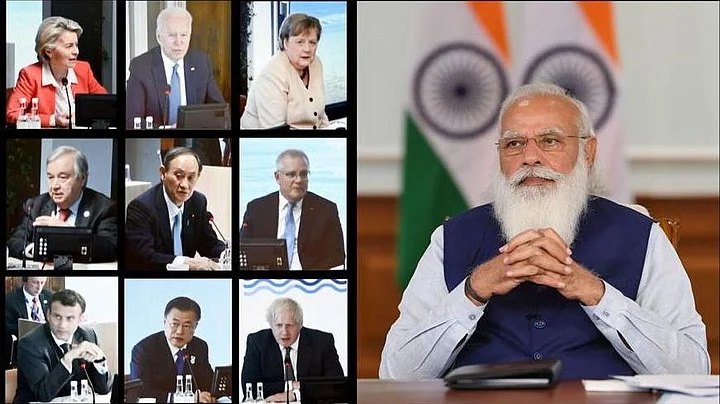Prime Minister Narendra Modi, speaking at the G7 summit on 13 June, Sunday, emphasised on the need to ensure that cyberspace remains an avenue for advancing democratic values and not of subverting them.
The summit, hosted by the UK, officially commenced on Friday, as leaders of the world’s largest economies congregated on the Cornish coast, for the first time since the outbreak of the coronavirus in 2020.
The Prime Minister participated virtually in two of the sessions held on the second day of the summit – ‘Building Back Together – Open Societies and Economies’ and ‘Building Back Greener: Climate and Nature’
The UK, which holds the presidency of G7 (Group of 7), had invited India, Australia, South Africa, and South Korea as guest countries to attend the summit. The focus for G7 summit 2021 is "Build Back Better".
In view of the devastating COVID-19 situation in the country, PM Modi had cancelled his visit to the UK for the summit in May and attended the session virtually.
What the Prime Minister Said
As a Lead Speaker of the conference on Open Societies, PM Modi stated that democracy and freedom were part of India’s civilisations ethos. He raised the concern that open societies are particularly vulnerable to disinformation and cyber-attacks.
In the session on climate and nature, Prime Minister Modi called for collective action on climate change.
He also advocated the adoption of a holistic approach towards climate change that covers all dimensions of the problem – mitigation, adaptation, technology transfer, climate financing, equity, climate justice, and lifestyle change.
Speaking about India’s unwavering commitment to climate action, he mentioned the efforts of the Indian Railways to achieve Net Zero Emissions by 2030.
He stressed that India is the only G-20 country on track to meet its Paris treaty commitments.
He also took note of the increasing effectiveness of the two major global initiatives nurtured by India – the CDRI and the International Solar Alliance, in building a greener economy.
In a G7 session titled ‘Building Back Stronger – Health,’ Prime Minister Modi on Saturday, 12 June, said that the summit should send out a message of "One Earth One Health" for the whole world.
He also expressed appreciation for the support extended by the G7 and other guest countries during the second wave of the COVID-19 pandemic in India.
The G7 Countries' Statement
Following the session on ‘Building Back Together – Open Societies and Economies’, the G7 members and guest countries, including India, signed a joint statement to adopts the values of “freedom of expression, both online and offline, as a freedom that safeguards democracy and helps people live free from fear and oppression”.
“We are at a critical juncture, facing threats to freedom and democracy from rising authoritarianism, electoral interference, corruption, economic coercion, manipulation of information, including disinformation, online harms and cyber attacks, politically motivated internet shutdowns, human rights violations and abuses, terrorism and violent extremism.”The Joint Statement
The statement also marks “politically motivated internet shutdowns” among one of the threats to freedom and democracy.
“We also face threats to our social fabric from persistent inequalities and discrimination, including racism and resistance to gender equality. In the midst of these threats we will work together to create an open and inclusive rules-based international order for the future that promotes universal human rights and equal opportunities for all.”The Joint Statement
The leaders of the United Kingdom, Australia, Canada, France, Germany, Italy, India, Japan, the Republic of Korea, South Africa, the United States of America and the European Union, reaffirmed their shared belief in open societies, democratic values and multilateralism as foundations for dignity, opportunity and prosperity for all.
The countries also agreed to “strengthen open societies globally by protecting civic space and media freedom, promoting freedom of expression, freedom of assembly and association, and freedom of religion or belief, and by tackling all forms of discrimination, including racism.”
'Need to Counter China': G7 Leaders
White House national security adviser Jake Sullivan on Sunday, 13 June, indicated that the G7 member countries had agreed upon the need to "counter and compete" with China on issues such as democracy and technology, as per a Reuters report.
Concurring that China’s growing influence was a matter of concern, the G7 members discussed China's contravention of human rights in Xinjiang and the requirement of autonomy for Hong Kong.
The leaders also agreed to support developing countries with infrastructure policies, such as the projects to build wind farms in Asia and railways in Africa, in order would enable them to compete with China’s systems.
“There is a broad view that China represents a significant challenge to the world’s democracies,” Sullivan said, adding, “Words like counter and compete were words coming out of the mouths of every leader in the room, not just Joe Biden.”
(With inputs from The Indian Express, IANS and Reuters)
(At The Quint, we question everything. Play an active role in shaping our journalism by becoming a member today.)
